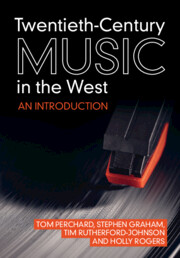Book contents
- Twentieth-Century Music in the West
- Twentieth-Century Music in the West
- Copyright page
- Contents
- Figures
- Tables
- Acknowledgements
- Introduction
- Part I Histories
- Part II Techniques and Technologies
- Part III Mediation
- 9 Recording and Production
- 10 Copyright and the Music Industry
- 11 States and Markets
- 12 Music and the Moving Image
- Part IV Identities
- Bibliography
- Index
11 - States and Markets
from Part III - Mediation
Published online by Cambridge University Press: 15 September 2022
- Twentieth-Century Music in the West
- Twentieth-Century Music in the West
- Copyright page
- Contents
- Figures
- Tables
- Acknowledgements
- Introduction
- Part I Histories
- Part II Techniques and Technologies
- Part III Mediation
- 9 Recording and Production
- 10 Copyright and the Music Industry
- 11 States and Markets
- 12 Music and the Moving Image
- Part IV Identities
- Bibliography
- Index
Summary
States and state-like supranational bodies have always sought to control music’s creation and dissemination. As early as the fourth century BC, Plato made explicit (in The Republic) the laws that a state should enact in response to the social benefits and threats posed by different musical scales. Twelve centuries later the Council of Trent considered the role of music among many of its reforms to the Catholic Church, recommending intelligibility of text, avoidance of secular expression and ‘only the divine phrases of hymnody’ be used in its music, such that ‘the hearts of listeners should be ravished by longing for heavenly harmony and by contemplation of the joys of the blessed’. Later still, in nineteenth-century Vienna, Franz Schubert laboured under a censorial regime promoted by Emperor Franz I and his anti-liberal foreign minister Prince Clemens von Metternich. In each of these examples, the battle can be seen as one between conservatism and modernity. The intervention of the state (or the church, as it may be), is almost always an attempt to regain control of meaning in the face of change. As the sociologist Howard S.
- Type
- Chapter
- Information
- Twentieth-Century Music in the WestAn Introduction, pp. 271 - 294Publisher: Cambridge University PressPrint publication year: 2022

